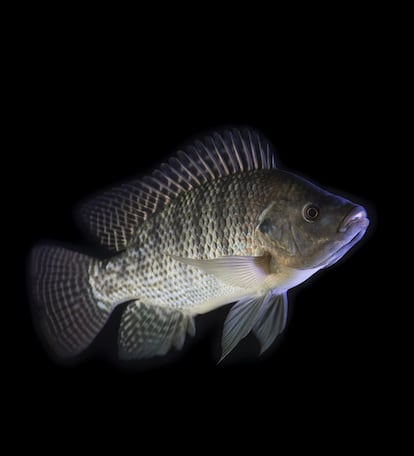The Egyptian fish that shows us why having a fever is very useful
Nile tilapia move to warmer waters when they become ill to mimic the effects of fever in warm-blooded animals

About 600 million years ago, when the evolutionary explosion that gave rise to the first animal forms was brewing, fever emerged. Some living beings discovered that, when they felt unwell, spending time in a warmer place could provide some relief. Today we know that this rise in temperature improves metabolism, optimizes immune functions, and suppresses the growth of pathogens. The strategy was so successful that cold-blooded animals, such as fish or lizards, have maintained it for millions of years, some seeking warm waters and others spending more time in the sun. When warm-blooded animals such as humans emerged, this defense system reappeared, but in this case without the need to seek heat, because these species can regulate their own internal temperature to achieve it.
On Monday, the journal PNAS published the work of a team of researchers from East China Normal University in Shanghai and the Marine Science and Technology Center in Qingdao who used Nile tilapia to understand why fever helps us when we suffer from an infection. And they confirmed that this survival strategy arose many millions of years before the appearance of warm-blooded animals.
In a laboratory experiment, researchers observed that tilapia infected with the bacteria Edwardiella piscicida moved to a warmer area of the tank for five days. This behavior, which is what a cold-blooded fish does to produce fever, triggered a series of changes in their bodies that helped them fight off the infection. As if the heat had been a wake-up call, their bodies slowed down the production of enzymes that destroy T-cells, which coordinate the adaptive response of the immune system, thus allowing them to live longer; meanwhile the T-cells in the spleen became more toxic.
When the tilapia felt weak and sought warm water, it lost its appetite and became lethargic, as happens to humans when they have a fever. Thus, the fish stopped eating and, just like with intermittent fasting, its body activated cellular autophagy, a recycling system that discards elements and releases energy to better respond to the infection.
The study of tilapia also shows how new elements that enter the toolbox of successful living beings are preserved for hundreds of millions of years, surviving countless species extinctions, and are combined with other innovations. When the fever first arose, no living being had adaptive immunity — the sophisticated defense system with which vertebrates defend themselves today. The rise in fever served to enhance innate immunity, which, unlike T-cells, does not specifically attack the pathogen that is causing problems. This part of the immune system was also analyzed in tilapia. When the fish approaches warm water, the transcription of nitric oxide, a powerful antimicrobial, is accelerated and proteins are produced that trigger an inflammatory response. In addition, high temperatures make it difficult for some viruses and bacteria to reproduce.
Around 450 million years ago, the first animals with adaptive immunity appeared, endowed with a series of mechanisms to identify the specific invader. Although the response is slower, it is also more effective and generates a memory that allows it to better repel subsequent attacks from the same organism. The study in PNAS shows how, although this defense mechanism emerged 150 million years after the fever, elements of adaptive immunity such as T-cells integrated the signals of the increase in temperature to be able to perform their work better in case of infection.
The authors of the paper recall that the ability to raise body temperature, either automatically as warm-blooded animals do or by moving to warmer places, as cold-blooded animals do, plays an essential role in improving immunity and fighting infections, which improves the chances of survival. In laboratory experiments, it has been seen that reducing fever with pharmacological methods or by preventing movement increases the mortality of infected animals.
Sign up for our weekly newsletter to get more English-language news coverage from EL PAÍS USA Edition
Tu suscripción se está usando en otro dispositivo
¿Quieres añadir otro usuario a tu suscripción?
Si continúas leyendo en este dispositivo, no se podrá leer en el otro.
FlechaTu suscripción se está usando en otro dispositivo y solo puedes acceder a EL PAÍS desde un dispositivo a la vez.
Si quieres compartir tu cuenta, cambia tu suscripción a la modalidad Premium, así podrás añadir otro usuario. Cada uno accederá con su propia cuenta de email, lo que os permitirá personalizar vuestra experiencia en EL PAÍS.
¿Tienes una suscripción de empresa? Accede aquí para contratar más cuentas.
En el caso de no saber quién está usando tu cuenta, te recomendamos cambiar tu contraseña aquí.
Si decides continuar compartiendo tu cuenta, este mensaje se mostrará en tu dispositivo y en el de la otra persona que está usando tu cuenta de forma indefinida, afectando a tu experiencia de lectura. Puedes consultar aquí los términos y condiciones de la suscripción digital.









































